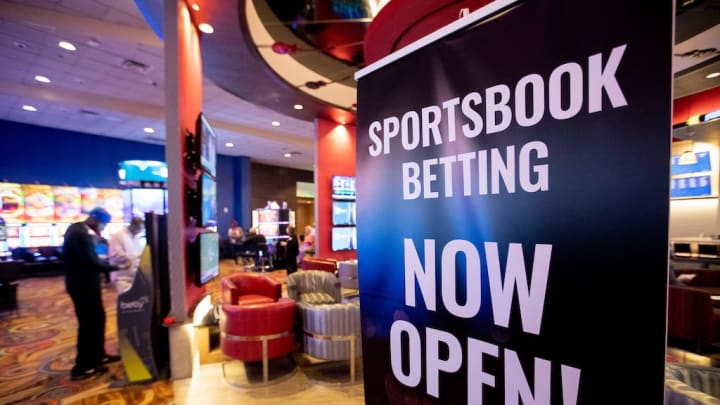Check the Polls: Sports Betting Could Soon Become America's Game

Which is America’s game, football or baseball?
The answer is well on its way to becoming: neither. With astonishing speed, the national pastime is becoming sports betting — to the benefit of the sports leagues that long had rejected the practice.
As their numbers grow, these bettors could also reverse the slide in sports viewership, boosting the fortunes of professional sports’ broadcast partners and the consumer brands that advertise during commercial breaks in the action. That’s because people with money on the line watch more games than non-bettors, with a third of gamblers saying they watch several events every day, according to our polling of American adults.
In the two-and-a-half years since the Supreme Court effectively legalized sports betting nationwide, 21 states plus the District of Columbia enacted legislation permitting gambling on professional sports. The latest to join in include Maryland, Louisiana and South Dakota, where on Election Day, voterse approved ballot referendums allowing sports betting. That figure could reach 37 states by the end of 2023.
Wagering on sports also has been spurred by the rocket rise of fantasy sports, itself a species of sports betting. According to the same research from the Harris Poll, 69% of sports bettors became interested in it after participating in a fantasy sports league.
The money is also big and getting bigger. In the two years following the Supreme Court’s May 2018 ruling, bettors have wagered more than $20 billion. That translated to more than $800 million in revenue in 2019 for casinos like MGM and Caesars and sports-betting sites led by DraftKings and FanDuel; a sum that could rise to $8 billion by 2025.
What once was happened only in Vegas no longer stays in Vegas.
That kind of scratch can expedite a lot of friendship with the lords of professional sports. Every major pro league has cut deals with sportsbooks by either selling their data to the bookmakers or enlisting betting partners. Individual teams are getting in the action, too.
My hometown Chicago Cubs announced in September a partnership with DraftKings that eventually will include a full-blown sportsbook operation within Wrigley Field. The Windy City has come full circle since the century-old Black Sox scandal, in which the 1919 Chicago White Sox admitted to throwing the World Series against Cincinnati Reds, nearly wrecking the sport. Perhaps not surprisingly, the White Sox don’t yet have an official betting partner.
This is quite the turnabout for pro sports, which collectively sued to stop the spread of sports gambling and was on the losing side in that 2018 Supreme Court case.
Cash payments aren’t the only reason teams suddenly loves gambling. Owners and executives also know that bettors have a literal and figurative investment in players, teams and outcomes of games. Exclusive new research from the Harris Poll found that 63% of sports gamblers have watched sports more frequently since they started gambling; and 73% agree they enjoy watching sports more when they have money riding on a game.
There’s no sign that the national passion for sports betting is close to topping out. Our research shows that younger adults are more likely to bet on sports (23% of 18-34-year-olds and 26% of 34-44) than older generations (19% of 45-54, 12% of 55-64 and 6% of those over age 65).
The guys you likely suspect to be most into sports betting are, in fact, guys. More than half of men ages 35-44 who gamble say they bet on sports at least once a day. But women are betting on sports, too, and present a growth opportunity.
Those aged 18-34 are dramatically more likely to engage in sports betting than their older counterparts. And the same data shows that women are more likely to start betting because their friends do, making it a real-world network effect: women betting prompt more women to bet.
In 2020, the league of sports bettors wasn’t enough to sustain interest in broadcast games and events. Viewership was down over the summer for pro basketball, hockey, baseball, golf and tennis, with ratings for the NBA Finals plunging 49% from 2019. The NFL’s TV audience is also smaller this fall compared to last year’s. Sports’ stumbles are one big reason ad spending on television is projected to decline 15% from 2019.
Don’t blame stay-at-home gamblers for any of this, however. The COVID-19 pandemic has only hastened the sports betting trend. While only 18% of Americans currently engage in sports betting, one-third of sports bettors started during the last nine months, according to our research. Professional golf has adapted accordingly.
Realizing that it uniquely lent itself to social distancing, the PGA scrambled to optimize itself for online betting, with tremendous success. “At DraftKings alone,” the Washington Post wrote, “the sportsbook handle for golf has increased tenfold this year compared with last.”
Such rapid success brings challenges, of course. An estimated 2 million Americans have severe gambling problems, according to the National Council on Problem Gambling, with another 4 million to 6 million having mild to moderate problems. Those figures — and the individual and family lives whose disruption they represent — are likely to rise as betting becomes more widely accessible. Leagues will also face renewed problems ensuring the integrity of their product and avoiding a Black Sox repeat.
But judging by the surge across the nation, it will not be too long before betting becomes a kind of meta national pastime — one diversion to rule all the rest.
***
Will Johnson is CEO of The Harris Poll, one of the world’s leading public opinion, market research and strategy firms as known as Harris Insights & Analytics. Will previously was president of BAV Consulting, a Young & Rubicam Group company.
Follow him on LinkedIn: William Johnson
Follow The Harris Poll on Twitter: @HarrisPoll
